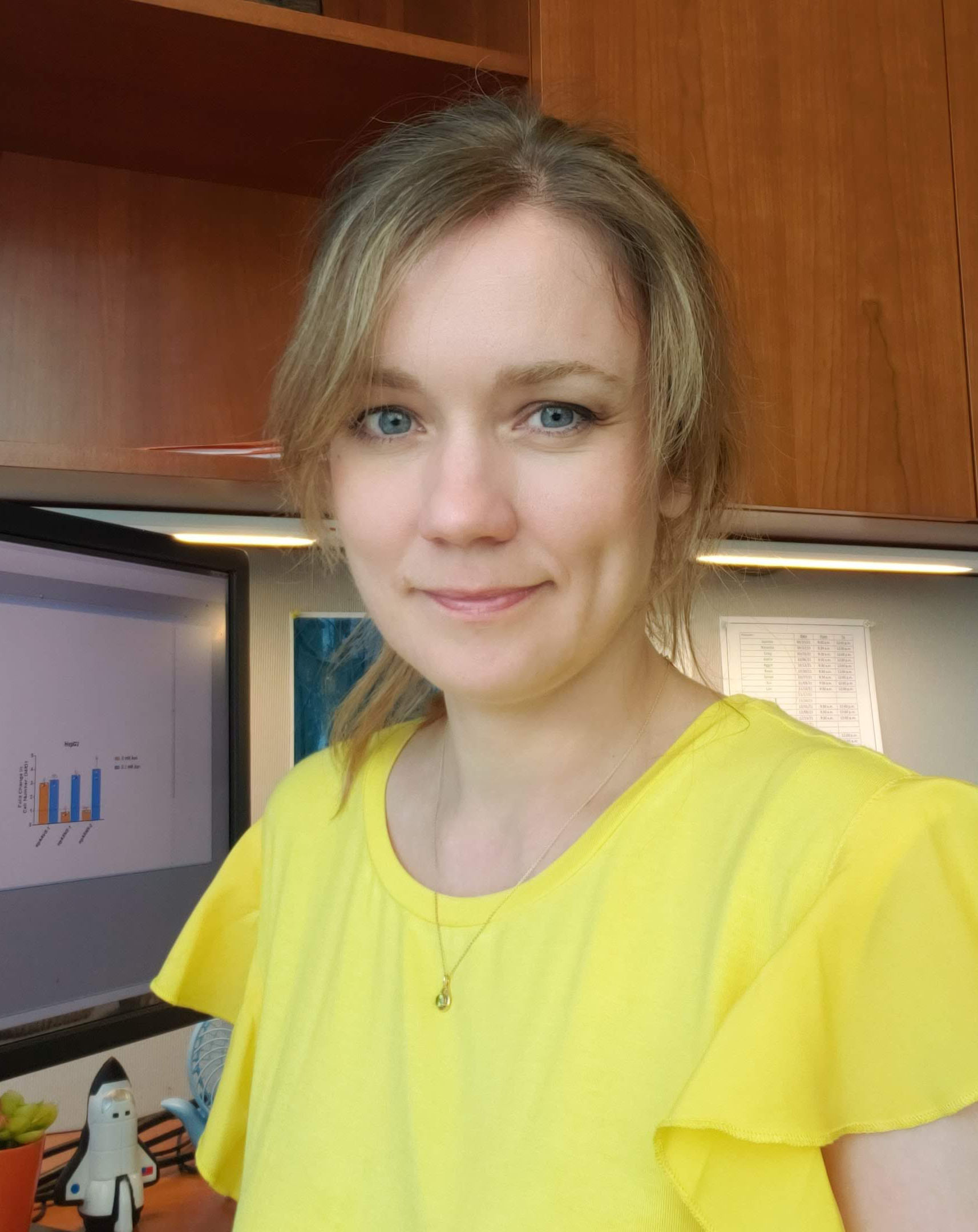Natasha Pavlova
Assistant Professor of Oncological Sciences and
Adjunct Assistant Professor of Biomedical Engineering
Cancer Metabolism, Tumor Microenvironment, Nutrient Sensing, Amino Acids, tRNA Charging, Regulation of Protein Expression, Cell Fate Determination

Molecular Biology Program
Education
B.S. University of Virginia
Ph.D. Harvard Medical School
Research
Our primary research goal is to understand how cells sense and respond to changes in amino acid supply around them. This is particularly pertinent to solid tumors, due to the high nutrient expenditure needed to fuel their deregulated growth. One amino acid that becomes particularly depleted in tumors is glutamine. Cells use glutamine for a variety of anabolic needs – among which are building various amino acids, nucleotide bases, glycosylation units and TCA cycle intermediates – in addition to using it directly in protein synthesis.
Interestingly, when we surveyed the charged status of the complete repertoire of amino acid-specific tRNAs in the cytosol of cells deprived of all amino acids, we found that exclusively glutamine tRNAs became uncharged – an effect that could be augmented by small molecule inhibitors of glutamine catabolism. Moreover, we found that long polyglutamine tracts (…QQQQQQQQQQQQQQQQ…) found in some proteins make these proteins sensitive to glutamine deficit. We are currently investigating the role of these mysterious sequences as built-in sensors of glutamine availability in various physiologic and pathophysiologic settings. Indeed, the glutamine-sensing capacity of these tracts may allow cells to quickly adjust levels of critical cell fate regulators based on nutrient availability. Moreover, since we can toggle the levels of such proteins via small molecule therapeutics that augment glutamine-tRNA availability, this work may lead to new therapeutic paradigms in cancer as well as in tissue repair.
If cancer cells are perpetually glutamine-deficient, how do they manage to successfully grow at all – both at their primary sites of origin as well as within distant organs as metastases? To tackle this question, we investigate which signaling and metabolic prerequisites allow cancer cells, as well as their various accessory cells (such as cancer-associated fibroblasts), to become independent of external glutamine supply and activate de novo glutamine production. We are particularly interested in how tumors summon various systemic metabolic regulators to help them carry out this task, and how we can translate this into tangible therapeutic strategies in cancer.
In addition to hypothesis-driven projects, we enjoy building new tools for studying amino acid metabolism in vitro and in vivo. Currently, we are working on building and validating a toolkit of polyglutamine-based reporters of amino acid deficit for in vivo studies. We are also developing a single-cell based method that uses the charging status of amino acid-specific tRNAs as a proxy for specific amino acid deficiencies. The goal of this method is to assemble high-resolution profiles of amino acid availabilities as a function of specific cell types and/or cell states within the complex ecosystem of a tumor.
References (Selected Publications)
- Chen YT, Lin YH, Rahman J, Cross J, Pavlova NN, Vardhana SA. Intratumoral amino acid insufficiency limits CD8+ T-cell effector function.BioRxiv [Preprint]. May 1,2025. Available from: https://doi.org/10.1101/2025.04.28.651077.
- Pavlova NN and Thompson CB. Oncogenic Control of Cancer Metabolism.Cold Spring Harbor Perspectives in Medicine. Oct 1;14(10):a041531. PMID:38565265.
- Pavlova NN, King B, Josselsohn RH, Violante S, Macera VL, Vardhana SA, Cross JR, Thompson CB. Translation in amino-acid-poor environments is limited by tRNAGlnElife. 2020 Dec 8;9. doi: 10.7554/eLife.62307. PubMed PMID: 33289483; PubMed Central PMCID: PMC7744096.
- Pavlova NN, Hui S, Ghergurovich JM, Fan J, Intlekofer AM, White RM, Rabinowitz JD, Thompson CB, Zhang J. As Extracellular Glutamine Levels Decline, Asparagine Becomes an Essential Amino Acid. Cell Metab. 2018 Feb 6;27(2):428-438.e5. doi: 10.1016/j.cmet.2017.12.006. Epub 2018 Jan 11. PubMed PMID: 29337136; PubMed Central PMCID: PMC5803449.
- Pavlova NN, Thompson CB. The Emerging Hallmarks of Cancer Metabolism. Cell Metab. 2016 Jan 12;23(1):27-47. doi: 10.1016/j.cmet.2015.12.006. PubMed PMID: 26771115; PubMed Central PMCID: PMC4715268.
- Pavlova NN, Zhu J, Thompson CB. The hallmarks of cancer metabolism: Still emerging. Cell Metab. 2022 Mar 1;34(3):355-377. doi: 10.1016/j.cmet.2022.01.007. Epub 2022 Feb 4. PubMed PMID: 35123658; PubMed Central PMCID: PMC8891094.
- Schwörer S, Pavlova NN, Cimino FV, King B, Cai X, Sizemore GM, Thompson CB. Fibroblast pyruvate carboxylase is required for collagen production in the tumour microenvironment. Nat Metab. 2021 Nov;3(11):1484-1499. doi: 10.1038/s42255-021-00480-x. Epub 2021 Nov 11. PubMed PMID: 34764457; PubMed Central PMCID: PMC8606002.
- Ranea-Robles P, Pavlova NN, Bender A, Pereyra AS, Ellis JM, Stauffer B, Yu C, Thompson CB, Argmann C, Puchowicz M, Houten SM. A mitochondrial long-chain fatty acid oxidation defect leads to tRNA uncharging and activation of the integrated stress response in the mouse heart. Cardiovasc Res. 2022 Apr 7;. doi: 10.1093/cvr/cvac050. [Epub ahead of print] PubMed PMID: 35388887.
